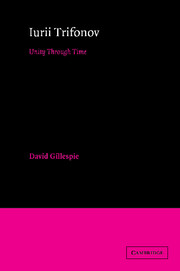Book contents
- Frontmatter
- Contents
- Preface
- Introduction
- 1 From Moscow students to the Turkmenian desert (Studenty; Utolenie zhazhdy)
- 2 Moscow life, 1966–1975 (Obmen; Predvaritel'nye itogi; Beskonechnye igry; Dolgoe proshchanie; Drugaia zhizn')
- 3 The house on the embankment (Dom na naberezhnoi)
- 4 Terrorism, Civil War and the present (Neterpenie; Otblesk kostra; Starik)
- 5 Time and place (Vremia i mesto; Ischeznovenie)
- Conclusion: unity through dislocation (Oprokinutyi dom)
- Notes
- Bibliography
- Index
- CAMBRIDGE STUDIES IN RUSSIAN LITERATURE
Conclusion: unity through dislocation (Oprokinutyi dom)
Published online by Cambridge University Press: 22 August 2009
- Frontmatter
- Contents
- Preface
- Introduction
- 1 From Moscow students to the Turkmenian desert (Studenty; Utolenie zhazhdy)
- 2 Moscow life, 1966–1975 (Obmen; Predvaritel'nye itogi; Beskonechnye igry; Dolgoe proshchanie; Drugaia zhizn')
- 3 The house on the embankment (Dom na naberezhnoi)
- 4 Terrorism, Civil War and the present (Neterpenie; Otblesk kostra; Starik)
- 5 Time and place (Vremia i mesto; Ischeznovenie)
- Conclusion: unity through dislocation (Oprokinutyi dom)
- Notes
- Bibliography
- Index
- CAMBRIDGE STUDIES IN RUSSIAN LITERATURE
Summary
After a discussion of the contrasts, mirror images and parallelism at the structural and thematic heart of Trifonov's fiction, it seems particularly apposite to introduce Trifonov's accounts of his later travels, published posthumously in 1981 under the title Oprokinutyi dom (‘The Overturned House’). These are seven accounts which vary considerably in style and content, but which are united by the author's persona, present in each, as well as his attempts to link places as superficially disparate as Las Vegas, Helsinki, Rome, Sicily, Paris and the Austrian Tyrol. Throughout the stories past and present come together, and places become linked within the author's own inner world. The author's contextualization of Russia and its conflicts within spatial and temporal parameters stretching across national boundaries and even continents is evident as early as Obmen. Here the Dmitrievs' two-storeyed dacha in Pavlinovo is said to be not at all like a Russian dacha, ‘rather like a factory house somewhere in the forests of Canada, or a hacienda in the Argentinian savannah’ (II, 32). These stories are all narrated in the first person, and are the most explicitly personal of Trifonov's later work. Trifonov may well have traversed the globe in his later years, but the stories are just as much about internal movement: the overcoming of ideologically imposed barriers of suspicion and division to embrace new concepts of belonging to one world: slitnost'.
- Type
- Chapter
- Information
- Iurii TrifonovUnity through Time, pp. 194 - 207Publisher: Cambridge University PressPrint publication year: 1993



